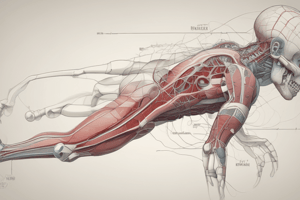Podcast
Questions and Answers
Where is McBurney's point located?
Where is McBurney's point located?
- One-third of the way along a line joining the anterior superior iliac spine and the umbilicus (correct)
- At the umbilicus
- On the symphysis pubis
- On the anterior superior iliac spine
In adults, when can the bladder be palpated above the symphysis pubis?
In adults, when can the bladder be palpated above the symphysis pubis?
- Never
- Only when full or enlarged (correct)
- Only when empty
- Always
What is the origin of the cremasteric fascia and muscle?
What is the origin of the cremasteric fascia and muscle?
- Internal oblique aponeurosis (correct)
- Transversalis fascia
- Rectus abdominis
- External oblique aponeurosis
What is the origin of the testicular artery?
What is the origin of the testicular artery?
What is the function of the pampiniform plexus of veins?
What is the function of the pampiniform plexus of veins?
Where do the lymphatics from the testis and epididymis drain?
Where do the lymphatics from the testis and epididymis drain?
What is the inguinal canal located in?
What is the inguinal canal located in?
What is the length of the inguinal canal?
What is the length of the inguinal canal?
What passes through the deep inguinal ring?
What passes through the deep inguinal ring?
What is the superficial inguinal ring?
What is the superficial inguinal ring?
What forms the medial part of the posterior wall of the inguinal canal?
What forms the medial part of the posterior wall of the inguinal canal?
What is contained in the inguinal canal?
What is contained in the inguinal canal?
What is a hernia?
What is a hernia?
What type of hernia is related to the inguinal canal?
What type of hernia is related to the inguinal canal?
What is the main cause of indirect inguinal herniae?
What is the main cause of indirect inguinal herniae?
Where does the hernial neck of an indirect inguinal hernia lie in relation to the inferior epigastric artery?
Where does the hernial neck of an indirect inguinal hernia lie in relation to the inferior epigastric artery?
Which organ lies below the left hemidiaphragm and deep to the 9th, 10th, and 11th ribs posteriorly?
Which organ lies below the left hemidiaphragm and deep to the 9th, 10th, and 11th ribs posteriorly?
At which level does the aorta bifurcate?
At which level does the aorta bifurcate?
Where is the pancreatic neck located?
Where is the pancreatic neck located?
What is the surface marking of the gall-bladder?
What is the surface marking of the gall-bladder?
What is the characteristic of the upper border of the liver?
What is the characteristic of the upper border of the liver?
Where do the kidney hila lie in relation to the spine?
Where do the kidney hila lie in relation to the spine?
Flashcards
Inguinal Canal
Inguinal Canal
A passage in the lower anterior abdominal wall, located above the inguinal ligament, approximately 4 cm long.
What is the function of the Inguinal Canal?
What is the function of the Inguinal Canal?
Allows the passage of the spermatic cord (or round ligament in females) through the lower abdominal wall.
Describe the course of the Inguinal Canal.
Describe the course of the Inguinal Canal.
Passes obliquely from the deep inguinal ring to the superficial inguinal ring.
Deep Inguinal Ring
Deep Inguinal Ring
Signup and view all the flashcards
Superficial Inguinal Ring
Superficial Inguinal Ring
Signup and view all the flashcards
What structure forms the anterior wall of the Inguinal Canal?
What structure forms the anterior wall of the Inguinal Canal?
Signup and view all the flashcards
What forms the superior wall of the Inguinal Canal?
What forms the superior wall of the Inguinal Canal?
Signup and view all the flashcards
What structures form the posterior wall of the Inguinal Canal?
What structures form the posterior wall of the Inguinal Canal?
Signup and view all the flashcards
What forms the inferior wall of the Inguinal Canal?
What forms the inferior wall of the Inguinal Canal?
Signup and view all the flashcards
What are the contents of the Inguinal Canal?
What are the contents of the Inguinal Canal?
Signup and view all the flashcards
Inguinal Hernia
Inguinal Hernia
Signup and view all the flashcards
What is an Indirect Inguinal Hernia?
What is an Indirect Inguinal Hernia?
Signup and view all the flashcards
What is a Direct Inguinal Hernia?
What is a Direct Inguinal Hernia?
Signup and view all the flashcards
Surface Marking of the Liver
Surface Marking of the Liver
Signup and view all the flashcards
Surface Marking of the Spleen
Surface Marking of the Spleen
Signup and view all the flashcards
Surface Marking of the Gall-bladder
Surface Marking of the Gall-bladder
Signup and view all the flashcards
Surface Marking of the Pancreas
Surface Marking of the Pancreas
Signup and view all the flashcards
Surface Marking of the Aorta
Surface Marking of the Aorta
Signup and view all the flashcards
Surface Marking of the Kidneys
Surface Marking of the Kidneys
Signup and view all the flashcards
Surface Marking of the Appendix
Surface Marking of the Appendix
Signup and view all the flashcards
Surface Marking of the Bladder
Surface Marking of the Bladder
Signup and view all the flashcards
What are the coverings of the Spermatic Cord?
What are the coverings of the Spermatic Cord?
Signup and view all the flashcards
What are the contents of the Spermatic Cord?
What are the contents of the Spermatic Cord?
Signup and view all the flashcards
Study Notes
Inguinal Canal
- Definition: A passage in the lower anterior abdominal wall, located above the inguinal ligament, approximately 4 cm long.
- Function: Allows the passage of the spermatic cord (or round ligament in females) through the lower abdominal wall.
- Course: Passes obliquely from the deep inguinal ring to the superficial inguinal ring.
Deep Inguinal Ring
- Location: Halfway between the anterior superior iliac spine and the pubic tubercle.
- Characteristic: An opening in the transversalis fascia.
- Relation: Inferior epigastric vessels pass medial to the deep ring.
Superficial Inguinal Ring
- Location: Above and medial to the pubic tubercle.
- Characteristic: A triangular-shaped defect in the external oblique aponeurosis.
Walls of the Inguinal Canal
- Anterior: External oblique aponeurosis, reinforced by internal oblique in its lateral third.
- Superior: Internal oblique arches posteriorly to form the roof of the canal.
- Posterior: Transversalis fascia forms the lateral part, and the conjoint tendon forms the medial part.
- Inferior: Inguinal ligament.
Contents of the Inguinal Canal
- Spermatic cord (or round ligament in females).
- Ilioinguinal nerve (L1).
Inguinal Hernias
- Definition: Protrusion of a viscera through an opening.
- Types: Direct and Indirect inguinal hernias.
- Indirect inguinal hernia: Arises from persistence of the processus vaginalis, bulges through the deep inguinal ring, into the canal, and eventually into the scrotum.
- Direct inguinal hernia: Arises from weakness in the posterior wall of the inguinal canal, cannot be controlled by digital pressure over the deep ring, and rarely passes into the scrotum.
Surface Markings of Abdominal Viscera
- Liver: Lower border is usually just palpable on deep inspiration in slim individuals, upper border follows the undersurface of the diaphragm.
- Spleen: Lies below the left hemidiaphragm, deep to the 9th, 10th, and 11th ribs posteriorly, and reaches the midaxillary line anteriorly.
- Gall-bladder: Fundus lies in the transpyloric plane (L1), surface marking corresponds to a point where the lateral border of rectus abdominis (linea semilunaris) crosses the costal margin.
- Pancreas: Neck lies on the level of the transpyloric plane (L1), head lies to the right and below the neck, and body and tail pass upwards and to the left.
- Aorta: Bifurcates to the left of the midline at the level of L4.
- Kidneys: Hila lie on the level of the transpyloric plane (L1), lower pole of the right kidney usually extends 3 cm below the level of the left.
- Appendix: McBurney's point represents the surface marking for the base of the appendix, located one-third of the way along a line joining the anterior superior iliac spine and the umbilicus.
- Bladder: In adults, it is a pelvic organ, can be palpated above the symphysis pubis only when full or enlarged.
Spermatic Cord
- Coverings: External spermatic fascia, cremasteric fascia and muscle, and internal spermatic fascia.
- Contents: Ductus (vas) deferens, testicular artery, pampiniform plexus of veins, lymphatics, and autonomic nerves.
Studying That Suits You
Use AI to generate personalized quizzes and flashcards to suit your learning preferences.
Description
This quiz covers the inguinal canal, its definition, location, and function in relation to the spermatic cord and abdominal wall.




